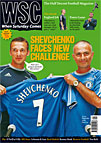 James Brandon reports on how Roman Abramovich's increasingly hands-on approach is making life difficult for José Mourinho
James Brandon reports on how Roman Abramovich's increasingly hands-on approach is making life difficult for José Mourinho
Sporting a new shaven-headed look, José Mourinho claims he is “ready for the war”. The posturing and the rhetoric are typically gladiatorial. But recent developments suggest that, like Samson, he may be losing his powers, in the transfer market at least. It seems like the biggest battle the Special One faces is finding a way to integrate his employer’s vanity signings into a winning and potentially job-saving formula.
Mourinho claims that the capture of galáctico twinset Andriy Shevchenko and Michael Ballack are all his doing. But if that is the case, it suggests a massive philosophical U-turn on the part of the Portuguese. Famously, when he first arrived at Chelsea and Roman Abramovich presented him with a list of possible signings (doubtless headed by the long-term object of his desire, Shevchenko), Mourinho allegedly scoffed: “I’m the only star you need.” It worked at Porto. It has worked for two years at Chelsea. But now he’s being made to sound like a frontman for the new Real Madrid.
“We went with them not because we want to sell shirts, not because we think Ballack or Shevchenko will give us money in terms of merchandising. We did not bring them to the club to increase the number of supporters in Germany or Ukraine. We brought them because we feel the team need these two superstars to improve. That,” growls Mourinho defiantly, “is the point.”
Actually, the point is hard to fathom. OK, the fact that their £120,000 a week each will upset the wage structure and have the rest of the squad and their agents demanding big rises is no big deal to a club with Abramovich’s chequebook at their disposal; but it is still, surely, an unwanted headache for a coach seeking internal harmony and equilibrium. Mourinho’s biggest problem, though, will be working out how the hell to accommodate his two new stars. By way of justification for the Shevchenko signing, Mourinho points to the fact that Chelsea have consistently lacked a 20-goal a season man. The Ukrainian has certainly been that during his time at Milan. But those who observed his lacklustre and inconsequential performances for his country in Germany this summer saw a player who looked two years past his prime. There is every danger that, like the last forward recruited from Italy, Hernán Crespo, he may soon turn into a bench-warming malcontent.
Ballack is even more of a conundrum, given the similarities to Frank Lampard and the familiar dangers of playing him with another attacking midfielder. And it is not as if Chelsea are not already awash with midfield options. Michael Essien and new £16 million recruit Jon Obi Mikel look set join Wright-Phillips and co on a midfield stockpile currently valued at around £60m. Can this really all be part of the strategy of a coach so well versed in team-building?
Part of the problem Mourinho that faces is that his boss is developing an increasingly insatiable obsession with ev-ents on the pitch. This summer, for example, when most self-respecting billionaires had their yachts berthed in Monte Carlo or Mustique, Roman’s launch was stationed in Lübeck, handily positioned so he could helicopter in to whichever World Cup game he fancied.
When Abramovich first bought Chelsea he was loudly berated back home for not choosing instead to put his roubles into a local club. However, his purchase of Chelsea has piqued such levels of obsession that the game back home is now benefiting on a far wider scale than it would have done had he just put his cash into Torpedo or CSKA Moscow. From investment in grassroots facilities – he is funding youth-coaching programmes and playing facilities in every region of the country – to his bankrolling of Guus Hiddink’s contract as national-team boss, Abramovich appears to be on a one-man mission to revitalise Russian football.
Many, at least in these parts, might puzzle at the wisdom of a coach of Hiddink’s stature opting for Russia over the more prestigious opportunity to take over from Sven-Göran Eriksson. It is partly down to Hiddink’s need to maximise his earnings as soon as possible. The Dutchman is embroiled in a long-running wrangle with the taxman over earnings accrued while in South Korea and is due to stand trial back in Holland in September for tax fraud.
Aside from an exceptionally lucrative contract paid for by Abramovich’s foundation, word has it that a deal has also been done to ensure that the Russia team do all their winter training at a complex in Spain, in which Hiddink has considerable financial interests. All in all, a long-term association with Abramovich might prove far more attractive than a relationship with the FA, whose budget presumably still has a massive Sven-sized hole in it.
Mourinho ought to keep half an eye on what his employer is getting up to back home, as it could well have implications for his own job security. It has been suggested that Hiddink, who is on a €2m (£1.35m) basic salary, is merely being “parked” in Moscow, in readiness for an eventual transfer to west London, as and when the Special One’s credit of trust, as the Russians like to say, runs out. A hat-trick of domestic titles might not be enough. Abramovich expects nothing less than the European Cup. Ballack and Shevchenko have expressly been signed to accelerate its arrival at Stamford Bridge. The irony for the Special One is that they could easily have the opposite effect and merely accelerate his own exit.
From WSC 235 September 2006. What was happening this month